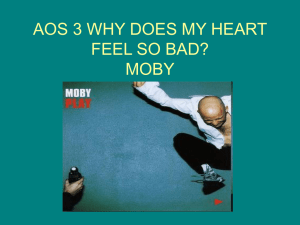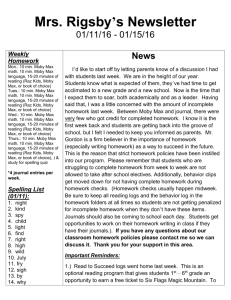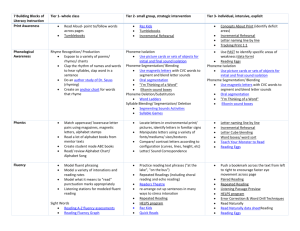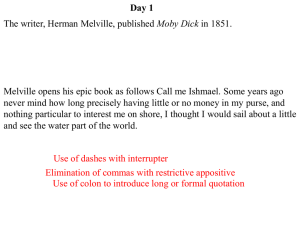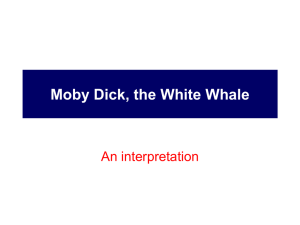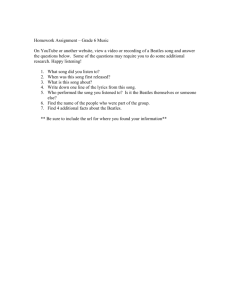MobyInterview6
advertisement
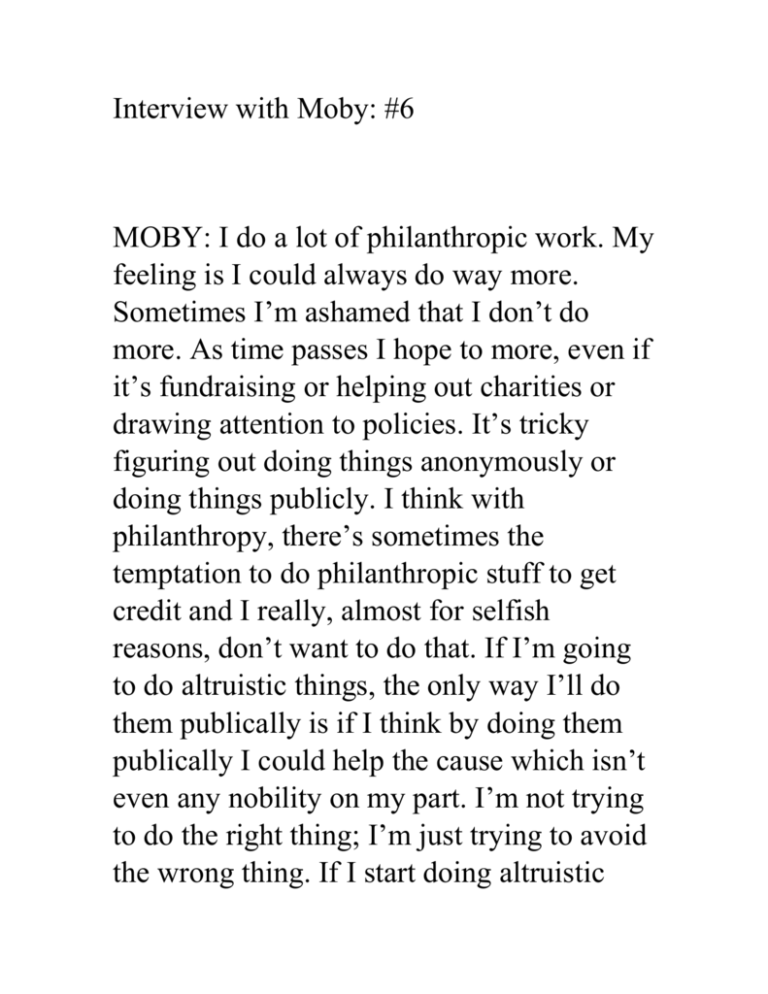
Interview with Moby: #6 MOBY: I do a lot of philanthropic work. My feeling is I could always do way more. Sometimes I’m ashamed that I don’t do more. As time passes I hope to more, even if it’s fundraising or helping out charities or drawing attention to policies. It’s tricky figuring out doing things anonymously or doing things publicly. I think with philanthropy, there’s sometimes the temptation to do philanthropic stuff to get credit and I really, almost for selfish reasons, don’t want to do that. If I’m going to do altruistic things, the only way I’ll do them publically is if I think by doing them publically I could help the cause which isn’t even any nobility on my part. I’m not trying to do the right thing; I’m just trying to avoid the wrong thing. If I start doing altruistic things publically and getting an ego benefit from it, I feel that defeats one of the reasons for doing it. It’s tricky finding out how I can do things publically to help the organization without it necessarily feeding my ego. JV: Like Comcast occasionally do goes acts, but they always have press releases announcing it. MOBY: I fully understand the seduction of wanting credit, but I don’t really like that part of myself very much and I don’t want to encourage it. Not that I could help build a hospital, but getting attention where it’s really not due. Then you have that feeling of being fraudulent, where people who work at the non-profits are making $26,000 a year and working 80 hours a week and getting no credit. Then comes along the self-important public figure who takes a couple pictures and gets credit for doing nothing. It just feels weird. JV: Do you have any causes that you’re involved with? MOBY: Animal rights. More Human Society. HSUS has an amazingly effective legislative arm because they have so much money and experience in the legislative arena that I really like to help them because… JV: Do you know about this law… to film slaughterhouses? MOBY: It offends me as an animal rights activist. It offends me as an American because it’s not constitutional. Do say the premise behind Ag-Gag is that the constitution doesn’t apply when business finds it disagreeable. Even if it wasn’t animal rights related… JV: Has that passed? MOBY: It’s state by state? JV: Is the Human Society fighting that? MOBY: Tooth and nail. Within the animal rights world, that’s everyone’s number one focus. For me, working with a lot of different democratic political causes like DSCC and the DNC and I worked a lot with getting our current mayor elected. It’s very concerning because he’s the first political I’ve worked with that’s younger than me. JV: That’s like the first time I noticed the Playboy playmate was younger than me. MOBY: A big one for me was the first time I encountered a policeman who was younger than me. So then, I’m obsessed with climate change. I’ve become a little Rainman-esque when it comes to climate change statistics. I could be the tedious guy at a party who talks about climate change for hours even though no one is interested. JV: This is another reason I’m so pessimistic about the future because we’re not doing much about these things. MOBY: Climate change is unstoppable. It’s so much more serious than almost anyone recognizes because one of the main things is when the U.N. releases reports on climate change, they don’t factor permafrost melting. Permafrost melting, there’s more carbon stored in the permafrost than has been released by humans since the beginning of the industrial revolution and it’s all melting. It has the potential to steep climate change exponentially. JV: Why isn’t in incorporated? MOBY: Because it’s a weird variable that they don’t know how to statistically involve. JV: It seems doomed right now. MOBY: Oh, we’re done. The only viable way to stop climate change is to get every volcano on the plant to explode constantly for the next two years. We’d need a global winter that would reset the climate clock. JV: Do you not think that every politician who is dying it is on the pay roll to the fossil fuel company? MOBY: Without a question. It’s something that sort of breaks my heart. JV: So your big one is animal rights? MOBY: Animal rights, human rights, and sex trafficking, which I just find so horrifying. JV: Who do you work with that battles sex trafficking? MOBY: Human Rights Watch. Then lots of little organizations. JV: What about climate change? Who is useful? MOBY: I’ve played fundraisers… Like Green Peace and the U.N. working together, but no one can do anything. You can draw attention to the issue so that people can talk about it, but it’s so monumental. It’s going to take a catastrophe for anyone to do anything. It would take a global dictator to come in and force people to change. If you’re bored in the airport, the new issue of National Geographic has a map of what the world will look like when the ice caps melt. Florida is gone. JV: Is that available online? MOBY: Probably. But you look at it and realize that the eastern seaboard of the United States is gone. Texas going up to Boston is gone; 10 to 20 miles of the coastline. JV: What’s the projections of the polar caps thawing completely? MOBY: There are three major ice sheets. Two in Antarctica and one in Greenland. No one knows. All modeling about these big ice sheets melting, whenever they model something it always ends up being too conservative. JV: You are not one of these people that hold the opinion that there’s not much of a difference between the Republicans and the Democrats? MOBY: I think there’s huge differences. I’m a Democrat. If there were a sane, rational, Republican who didn’t believe in creationism and who accepted since and believed in a woman’s right to choose and women’s equal rights, I would support that person. That’s like a unicorn; it doesn’t exit. JV: Aren’t they just two sock puppets on a rich man’s hand? MOBY: There are enough differences between Democrats and Republicans that it must makes me consistently support Democrats. I don’t love the Democrats. I do see them suffering from being sissies. The Republicans have kicked out all the moderates. All the moderate Republicans keep getting marginalized. JV: They really do seem like they’re on a suicide path, and the Tea Party is pushing them there. They keep loosing and saying they’re not conservative enough. It’s just like, people don’t agree with you. MOBY: For a while modern rock radio when harder and hard and got more listeners. The same way the Republican went to the right and got more Republicans, but then the people that modern rock attacked wanted to go even harder, which alienated people. Then all these hardcore modern rock stations playing Disturbed went out of business. It’s kind of like that with Republicans. JV: The tail end of the modern rock period was horrible. MOBY: It’s funny because I was playing a lot of radio festivals during that time because the modern rock stations would still want to have some weird guy on the bill to say they weren’t just a metal station. I remember playing Live 105, a station in San Francisco, but I played this Christmas show and it was like Papa Roach, Disturbed, Limp Bizkit, Puddle of Mud, etc. I literally walked on stage and people just started throwing anything. I walked off stage and I was like, “I’m done.” It’s what I call the Radiohead moment, like, “What the hell am I doing here?” JV: Did you play your show? MOBY: We tried. We played for like 10 minutes, but it was so hostile that we had to leave. I had been booked to do other of these modern rock shows, but I was like, I can’t play in between Papa Roach and Disturbed. JV: That was kind of the end of the corporatization of alternative rock music. It kind of just flamed itself out. Weird music was left on its own and it was born again. Now we have this fascinating stuff in this neo-indie area. But getting back to the new record, someone called you Brian Eno For the Britney generation; true or false? MOBY: We have the same hairline. Brian Eno has been involved in so many of my favorite records that without which I wouldn’t make the music that I make, so I can’t even say my name and Brian Eno’s name in the same sentence. It’s like that Wayne’s World thing where he meets Alice Cooper. JV: Have you met him? MOBY: I did a remix for him in 1992 and I talked to him on the phone and I was so nervous. I couldn’t believe that I was talking to Brian Eno on the phone. I held my shit together and I’m sure I seemed calm and sane, but afterwards I had to run around the block 50 times just to get the nervous energy out of my system. JV: How do you write or build a song? MOBY: Every song starts differently. More often than not it starts with acoustic guitar. That’s what I grew up playing. So the songs will start with acoustic guitar, I’ll record a demo with acoustic guitar, and then I’ll add in all the weird stuff. At some point the acoustic guitar usually gets taken out. I usually don’t like the way acoustic guitar sounds. It’s only on one track on the record, “The Perfect Life”, and it’s mixed so quietly that you can’t really tell it’s there. Either acoustic guitar or piano is how a song usually starts. But sometimes it’s a drum machine, sometimes it’s a vocal sample, sometimes a weird synthesizer. JV: But it’s always instrumental first? Vocals or lyrics come much later? MOBY: For the most part, yeah. JV: Did all of the guests on this record at least collaborate on the lyrics? MOBY: Like the song I did with Wayne, I wrote the lyrics. Almost everything else I would send an instrumental to the singer and they would write the lyrics and the vocal melodies and send the idea back to me. Usually we would meet up in my studio and work on it a little bit. I didn’t really contribute much to the lyrics on the record because all the people I worked with wrote really nice lyrics. I didn’t want to tinker for the sake of tinkering. JV: You mentioned somewhere though that “The Perfect Life” is such a dark song. What is it about it? MOBY: Earlier we were talking about the human condition and how we try to make our lives bearable, and in my own experience and a lot of my friends’ experiences, drugs were part of it. Normally to alter our neurochemistry, we have to do something. Drugs and alcoholic were amazing because you don’t do anything. That’s what the song is about; achieving the perfect life very directly. Of course drug abuse is awful and it ruins peoples’ lives, so it’s a sort of slightly sad, ironic look at that. Clearly the life you get when you’re high is not the perfect life, but it’s what people are trying to get. There’s a reductionist sort of simplicity to it. There’s a heartbreaking simplicity to drug abuse and drug addiction that sort of inspired the song. Not doing drugs to have fun, but doing drugs to make their next few hours bearable. JV: So the second verse is Little Mike? MOBY: I think he says Little Mikey. JV: All the needs is a lighter and…? MOBY: A bed and some china, a lighter and some speed. JV: Why did you want Wayne to sing on that song? MOBY: In 1995 I opened for The Red Hot Chili Peppers in Europe and The Flaming Lips were also on the bill and so we shared a dressing room and became friendly and I always loved The Flaming Lips music, but their whole approach – all the weird, odd, interesting stuff they do – they’re really inspiring and I always found Wayne to be really inspiring. When I wrote the song “The Perfect Life”, in my own twisted sense, it sounded like a Flaming Lips songs. I simply thought to myself, if I wrote a song that sounds like The Flaming Lips, then why not see if Wayne will sing on it. So I texted him and a minute later he said, “Sure!”. JV: Cold Specks? MOBY: In making the record, I knew that I wanted to have a lot of interesting voices and I wanted to find people who had really interesting but beautiful voices and had a really interesting approach to lyric writing and I asked Danielle Miller, who owns Mute Records, who he would recommend and the only person he recommend was Cold Specks. He sent me a link to her music and I just immediately knew. I sent her some instrumentals and she wrote the lyrics and the vocal melodies around them. Then, as was often the case, I would rewrite the song around her vocals. JV: Is that her singing everything on that or is there vocal sampling on there? MOBY: There’s no vocal sampling on that one, but my friend Inyang Bassey sings on that one too. It’s one of those things where there are like 30 background vocals. JV: Tell me about Inyang. That song is great. MOBY: I was going on tour about 5 years ago and my usual singer in the U.K. couldn’t get a visa, so I very quickly had to hire a singer and she showed up and her voice was just perfect. I found out later that she had never really sung professionally, and when I had hired her to sing with me, she was currently working at Carnage Hall in their experimental classic music program and she grew up listening to the Dead Kennedys. So take this punk rock person working in Carnage Hall and suddenly get her to sing soul and gospel. JV: When did it occur to you that that was perfect for your music, to have female soul and gospel singers? MOBY: I don’t know. I think a lot of it was house music and rave music. In the late 80’s and early 90’s almost every house record had disco vocals on it. It became this hardwired pavlovian thing where I would go out and I would hear these amazing, euphoric house records with African American vocals on them, so it just made me think that if I wanted to make music that I like I have to use female vocals. This is the first time I’ve really worked with men. JV: Why? MOBY: Because I’ve slowly over time accepted that men can sing well, too. JV: Someone coined the term soultronica. What do you think about that? MOBY: It’s apt but clunky. JV: What about Mark Lanegan? How did that come about? MOBY: I knew of him from Screaming Trees. Every now and then I would hear his voice in some context and always be struck with how great it was. About two years ago I went to a fundraiser and he was singing and he did a cover of a Gun Club song and I heard him sing it and it just was perfect. So I actually went backstage and approached him and said, “Excuse me sir, would you consider singing with me.” I thought he would laugh at me or punch me in the face, but he was actually really kind and completely open to it. JV: And he wrote his lyrics? MOBY: Yeah. Because we both have battled some similar demons… JV: Is he sober? MOBY: Yeah. That’s why he lives in LA. JV: What do you mean that’s why? MOBY: Community. The lyrics are very much about that so we can relate on that level. JV: “Almost Home” is a great song; I could see that being a big hit. MOBY: I don’t know. I heard Damien Jurado on a college radio and I remember going home and trying to figure out how to spell his name. I found out who he was and had my manager contact his record label and I sent him some instrumentals and he wrote that song and I was like, “that’s perfect.” Then we hung out, and it turns out that in the mid-90’s, my album Everything Is Wrong was a really important record for him, which I was very flattered and surprised to find out. JV: Did all of these people come into your studio to do their vocals? MOBY: Most did. Mark did, Cold Specks did, Skylar Grey did, Inyang records his vocals in Seattle and Wayne in Oklahoma. JV: Tell me about Skylar Grey. I don’t know about her. MOBY: Her story is so cool. She moved to LA when she was 18 or 19 to be a singer/songwriter and it didn’t work out. She got signed and put out a record on Universal and opened for Better Than Ezra on tour, and it just didn’t work out. She retired at the age of 22 and moved to a cabin in the wood in Oregon and kept writing music and sent one of her songs to some producer and he liked it and he played it for Eminem and he liked it and it became this huge song called “Love The Way You Lie”. She went from being a retired 23-year-old songwriter to being the most successful song of the year. Then she wrote for all sorts of other people. Now she has an amazing career of being a featured songwriter and she’s making her own album, which ironically enough, was produced by Eminem. I’m not so interested in the pop thing, I just thought her voice had a purity to it and the lyrics that she wrote seemed very poignant as well. JV: Who wrote those lyrics? MOBY: She did. JV: I get this sort of end of the world kind of thing and not realizing the beauty till it was gone. MOBY: That’s the song.
